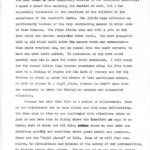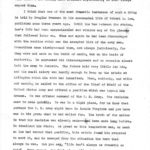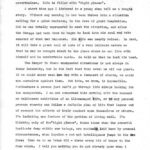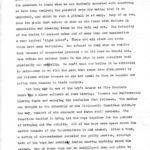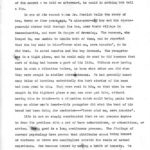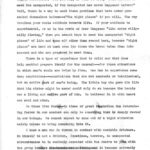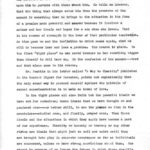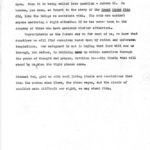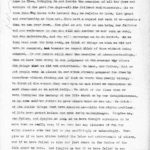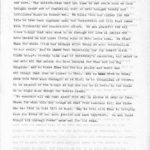Pine Mountain Settlement School
Series 05: Directors
Glyn Morris
TALKS 1937 ‘Tight Places’
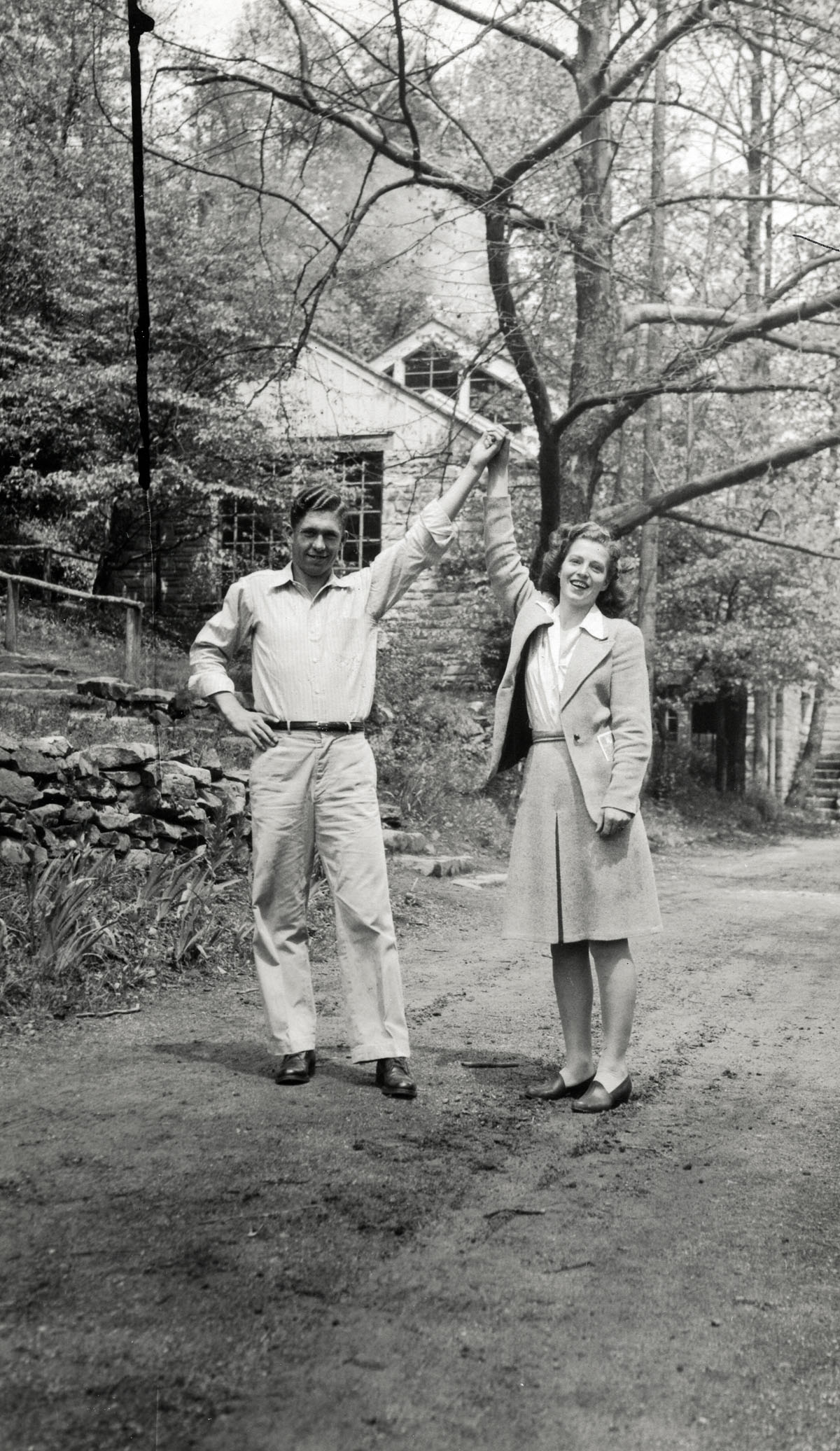
13_2472 Couple standing in road, hands clasped & arms raised. [098_IX_students_13_2472_008.jpg]
TAGS: Glyn Morris, Pine Mountain Settlement School management, decision-making, personnel decisions, personal decisions, cultural differences, dispute settlements, meeting adversity, moral choice, interpersonal relationships
GLYN MORRIS Talks 1937 ‘Tight Places’
In this talk, Morris addresses a multitude of errors in judgment that can get individuals and groups in trouble. He calls these incidences “tight places”. His advice is both specific and general but gets at the heart of the difficult task of working through a “tight place.”
GALLERY: GLYN MORRIS Talks ‘Tight Places’ 1937 (and Prayer)
“…courage to carry through in unusual and unexpected situations.”
- 001 morris_1937_talk_tight_places_001
- 002 morris_1937_talk_tight_places_002
- 003 morris_1937_talk_tight_places_003
- 004 morris_1937_talk_tight_places_004
- 005 morris_1937_talk_tight_places_005
- 006 morris_1937_talk_tight_places_006
- 007 morris_1937_talk_tight_places_007
- 008 morris_1937_talk_tight_places_008
- 001 morris_1937_talk_tight_plac_001
- 001a morris_1937_talk_tight_plac_001a
GALLERY: GLYN MORRIS Talks ‘Tight Places’ 1937 (and Prayer)
[Note: All eight pages of the talk are typewritten carbon copies. The two pages containing the prayer are typewritten originals. The text has been lightly edited. All pages are located among the papers of Glyn Morris.]
001 – Page 1
TIGHT PLACES
A short time ago at Pine Mountain we held a dental clinic for the half dozen or more elementary schools in our scattered community. I spent a short time watching the dentist at work, but I was especially interested in the reactions of the children to the experience of the dentist’s chair. Two little boys attracted me particularly because of the very contrasting manner in which each of them behaved. The first little chap sat with a grin on his face while the dentist extracted three teeth. The next youngster held up all right until after the second tooth was extracted— then panic overtook him, and he jumped from the chair refusing to have any more teeth pulled. No persuasion of any sort could prevail upon him to have the third tooth extracted. I felt sorry for the second little chap because somewhere along the line there must be a feeling of regret for his lack of bravery and for his failure to stand up under the strain of that particular moment. He fell to pieces in a tight place, because he didn’t have what was necessary to carry him through an unusual and unexpected situation.
Life is a series of adjustments …
Someone has said that life is a series of adjustments. Most of our adjustments can be made slowly and with some deliberation. But from time to time we are confronted with situations where we just do not have time to think; where the immediate urge is so strong that it shuts out all else; where we must make our decisions quickly and sometimes under great strain and pressure. These are the “tight places” of life. Some of us will find ourselves, by circumstance and because of the makeup of our personalities, in tighter places than others. But no one of us can hope to escape completely some “tight places” in life. While these events are
002 – Page 2
probably more numerous in the earlier part of life, during that time when we are making more frequent adjustments, we must always expect them.
I think that one of the most dramatic instances of such a thing is told by Douglas Freeman in his monumental life of Robert E. Lee, published some three years ago. Until [before] the war between the states, Lee’s life had been unspectacular and without any of the glamour that followed later on. Time and again he had been discouraged with the routine which was the accepted life of the army man. Promotions came slowly—and then, not always judiciously, for they were not made on the basis of merit, but on the basis of seniority. He expressed his discouragement and on occasion almost left the army in despair. The future held very little for him, and his small salary was hardly enough to keep up the estate at Arlington which his wife had inherited. Then, suddenly, and without warning he [was] called to the office of the Chief of Staff of the United States Army and offered a position which was beyond his dreams. He was offered command of the U. S. Army.
The decision must be made quickly. He was in a tight place, for he knew that perhaps the U. S. Army might have to invade Virginia and yet here was, in his grasp, what he had waited for. The truth of the matter is that his decision was already made—had been made long before. He idealized his State [Virginia]. As great as this temptation was, as much as Lee had wanted that position, this crisis found him prepared to meet it, and he emerged from the situation the hero that always he was. But you say, “Life isn’t always as dramatic as this”. True enough, for most of us will not be historical figures, nor will the account of how we met or did not meet the “tight places” ever get into print. Most of our struggles will
003 – Page 3
take place unknown to anyone else, but the fact is just as true, nevertheless. Life is filled with “tight places”.
A short time ago I listened to a young chap tell me a tragic story. Without any warning he had been thrown into a situation calling for a quick decision, in the face of great temptation. But he was totally unprepared to meet the situation, and after the damage had been done he began to look into his soul and take account of what had happened. His life was nearly ruined. In fact, it will take a great deal of care of a very delicate nature so that he may be brought about to the place where he can live with himself and be comfortable again. He told me that he lost his head.
The danger in these unexpected situations is not always in their intensity, but in the fact that they catch us off our guard. If we could enter each new day with a forecast of events, we could arm ourselves against them. But this, we know, is impossible. Furthermore, a person just can’t go through life always looking for the unexpected. I am not concerned this morning with the sequent or deliberate activities of an ill-managed life, or of any general process whereby men follow a definite plan of life that leaves out of account the effects of their conduct upon themselves or others. I’m isolating one feature of the problem of living well. I’m thinking only of the “tight places”, those times when the powerful instincts deep within our beings, are suddenly laid bare by unusual circumstances when impulse – and not intelligence jumps to the fore: When we do as Peter did – throw every bit of honor to the four winds.
I tell you nothing you do not already know when I mention such things as the opportunity to save yourself from a very uncomfortable situation in which there is much at stake, by
004 – Page 4
telling a lie; the sudden and unexpected opportunity for material gain that sometimes presents itself; when money suddenly brings its pressure to bear; when we are suddenly accosted with something we have long desired; the powerful urge for mating that is so universal, and which is such a pitfall to so many. Many of us too, know the panic that seizes us when we are faced with failure in examination and cheating looms as the only way out. The intensity of our desire to succeed makes out of more than one examination, a very typical “tight place”. These are all clear-cut areas that have many variances. How ashamed we feel when we realize that because of unexpected pressure – we did what we should not. Deep within our natures there is the urge to save ourselves both physically and mentally. We don’t want our bodies to be submitted to pain–nor do we wish the pain that comes from disapproval by our fellows either because we are not equal to them or because our action runs counter to their desires.
Blowing a fuse
Not long ago in one of the boy’s houses at Pine Mountain, there was a minor epidemic of fuse blowing. Someone was deliberately blowing fuses and enjoying the confusion that followed. The matter was brought to the attention of the Citizenship Committee which, by the way, consists of six students and three staff members, The Committee decided to bring all the boys together for the purpose of bringing out the culprit. All of the boys were upset about the matter because of the inconvenience it had caused. After a time, a series of circumstances revealed the guilty parties, although both of the boys had publicly denied knowing anything about the matter. One of these boys was an intelligent chap not given to making trouble nor to falsehood. Ordinarily, he is unusually frank and straightforward. But suddenly faced with public
005 – Page 5
disapproval – he was a different individual, and under the pressure of the moment – he told me afterward, [that] he could do nothing but tell a lie.
In one of his recent books, Dr. Fosdick tells the story of how, three or four years, ago, “a nine-year-old boy and his eleven-year-old sister fell through the ice, near their village in Massachusetts, and were in danger of drowning. The rescuer, who leaped in, was unable to handle both of them, and he reported that the boy said to him–“Never mind me, save Annette”, so he did that. He saved Annette and the boy drowned. The youngster was in a tight place, and he could only do what he did because that sort of thing had become a part of his life. Without ever having been in such a situation before, he knew what other men did when they were caught in similar circumstances. He had probably heard many tales of heroism; undoubtedly the best stories of the race had been read to him. They were real to him so that when he was caught in the tightest place a man can ever get into, without having time to think—in a situation which would bring panic into many an older man’s heart–this youngster did what the best of his breed had been doing for centuries—“Never mind me, save Annette”.
Life is not so simply constructed that we can prepare anyone to face its problems with a set of bare exhortations, admonitions, or advice. Being good is a long continuous process. The findings of current psychology have proven that platitudes about being honest or virtuous or brave are meaningless outside the realm of actual experience. One becomes honest by making a habit of honesty. We know that each new situation in which we find ourselves has new elements about which we cannot be sure beforehand. And furthermore—we know that one cannot hope to deal with a problem in the future
006 – Page 6
without having had some experience with similar problems in some degree beforehand. So, you say, if this be true, “Then how can we meet the unexpected, if the unexpected has never happened before ?” Well, there is a way to meet these problems that have never presented themselves before — “the tight places” if you will. The way involves your whole attitude towards life. If your attitude is experimental, or as in the words of Omar Khayyam: “like water willy-nilly flowing,” then you cannot hope to meet the unexpected “tight places of life and come off other than second best, because “tight places” are hard at best even for those who have taken them into account and who are prepared to meet them.
There is a type of experience that is valid and that does help mankind prepare itself for the unusual–for those situations in which men’s souls are tried by fire. One has to experience some deep convictions—convictions that are not academic or intellectual, but an active part of one’s being. The little boy who gave his life [so] that his sister might be saved could only do so because the heroic was a living and active part of him. He believed in it with heart and soul and mind.
In times like that—in times of great temptation the determining factor in our conduct can only be something that is deeply rooted in our beings. We cannot expect to come out of a tight situation safely unless we bring something into it.
I know a man who is thrown in contact with sociable drinkers. He himself is not a drinker. Sometimes, however, in unexpected circumstances, he is suddenly accosted with the desire to join with the group because it becomes extremely embarrassing not to do so. The small amount of beverage that he would consume would not hurt him and, actually, he would not find
007 – Page 7
any pleasure in it. But the pressure of opinion weighs heavily upon him to partake with those about him. He tells me, however, that the thing that always saves him from the pressure of the moment is something that he brings to the situation in the form of a promise made powerful and sacred because it involves a mother and her ideals and hopes for a son whom she loves. That is his source of strength in the hour of that particular temptation. As time goes on and the invitation to drink comes again, what he will do becomes less and less a problem. The reason is plain. In the first “tight place” he was saved because he had something bigger than himself to fall back on. In the confusion of the moment—that and that alone came to his rescue.
Mr. Peattie in his letter called “A Way to Chastity,” published in the Reader’s Digest for December, points out emphatically that the only sound way to protect oneself against the pitfalls of sexual experimentation is to make an ideal of love.
In the tight places, all else fails but the powerful ideals we have set for ourselves; those ideals that we have thought on and pondered over—or better still, to use the phrase we find in the mountains—studied over, and finally, prayed over. Then these ideals and the situations in which they apply have become a part of our experience. Chastity or honesty or bravery or any other virtue are ideals that might just as well not exist until they are brought into play in concrete occurrences as far as individuals are concerned unless we have strong convictions about them. One cannot be unaware of or ignore the issues in which these specific ideals are involved, and then in a crisis expect them to come into action. For example, if the idea of chastity is to function in anyone’s life, one must think about it as an ideal, approve of it,
008 – Page 8
read books in which the hero approves of it, and live in history with others who approve of it. Be in constant guard lest it be encroached upon as it is being called into question – defend it. We become, you know, as Ernest in the story of the Great Stone Face did, like the things we associate with. The odds are against anyone mastering a tight situation if he has never been in the company of those who have mastered similar situations.
Unpredictable as the future may be for each of us, we know that sometimes we will find ourselves beset upon by sudden and unforeseen temptations. Our safeguard is not in hoping that luck will see us through, but rather, in building up within ourselves through the power of thought and prayer, devotion to—the ideals that will stand by us, when the tight places come.
Prayer
Eternal God, gird us with such living ideals and convictions that when the sudden wind blows, the storm rages, and the clouds of conflict make difficult our sight, we may stand firm.
Prayer: 001 – Page 1
Prayer — Tight Places —
Eternal Spirit, our Heavenly Father, whose face we cannot see, but whose spirit we feel in the kindness of friends, and in all that is good and true and beautiful, we draw nigh to thee and bless Thee. We come to Thee, bringing in our hearts the memories of all the joys and sorrows of the past few days—all the failures and successes. As we come into thy house this Sabbath day, we rejoice to know, that great and everlasting as Thou art, Thou hast a regard for each of us—greater than we can ever know. How glad we are that we can bring our failures and our weaknesses to one who will not condemn us nor turn us away, but who understands, and who will encourage us to do better. As we look back over the busy week, we think of things we wish we did not have to remember, because we cannot think of them without being ashamed. In our hearts still burn the memories of misunderstandings, when we have been wrong in our judgment on the reasons why others did things that we did not understand. We know, our Father, that we put people away in places in our minds already prepared for them by ourselves without finding out if that is where they really belong. We think of the events that came upon us and found us unprepared to meet them—and so we acted badly. We think of the times when we have disrupted the harmony of the life about us by our thoughtlessness, or by some selfish desire to have others hear or see us. We think of the little things that have annoyed us—while the mighty problems of life have passed before our eyes daily unchallenged. Forgive us, our Father, and forgive us, too, if we have thought ourselves to be more than we really are; if we have had any pleasure or fun for which someone else has had to pay unwillingly or unknowingly. Forgive us if we have hidden behind the labor and achievements of others, and if we have failed to take our just share in the duties of the life about us here. And forgive us too if we have failed to see anything good in people and in things.
Prayer: 001a – Page 1a
We bring Thee too this morning the memories of our successes. How glad we are for these, and how satisfying it is to remember them. Work well done, and the feeling away down deep that we have done our best. The satisfaction that has come to our souls when we have brought order out of confusion; when we have brought beauty and loveliness where no beauty was. We bless Thee our Father for the life we live here together amid the inspiration and help that comes from friendship and cooperative effort. We are grateful for all those things that have come to us through the love of people who have passed on and those living whom we have never seen. We bless Thee for these hills and valleys which bring so much satisfaction to our souls. And we thank Thee especially for Thy church which binds today’s worship with that of yesterday’s centuries, and makes us one with all the saints who have labored for Thee and for Thy Kingdom. And we bless Thee too for all poetry and music and at all things that draw us closer to Thee. May we have with us today from this hour more strength to be kind; to be thoughtful of others; to be careful of the things we say and do; to be brave in our souls to do right even though our hearts break.
We remember all who must spend this day in sorrow or pain or fear. Those for whom this day brings no rest from ceaseless toil and those who can find in this life no hope. May we join with Thee in bringing into the lives of men more justice and more happiness. We ask these things ourselves to be things all through Jesus’ name and for his sake.
SEE ALSO:
GLYN MORRIS Director
GLYN MORRIS Talks 1937 ‘Tight Places’

